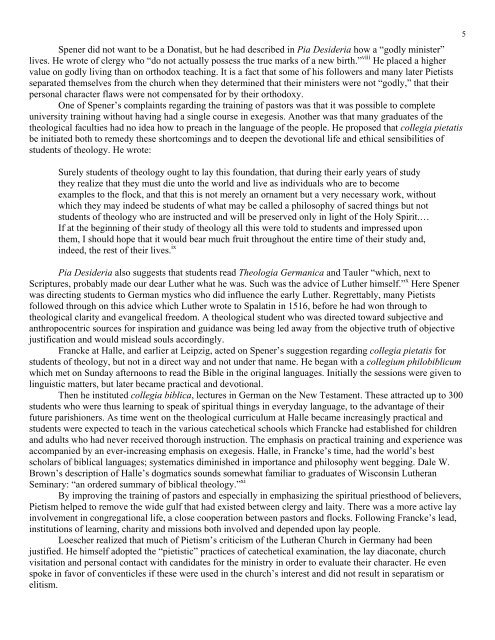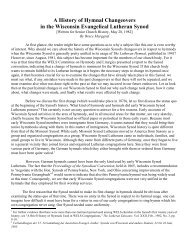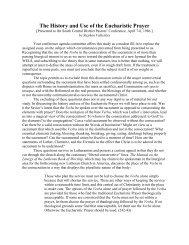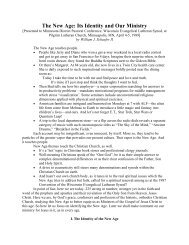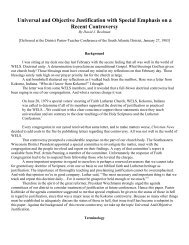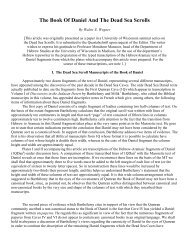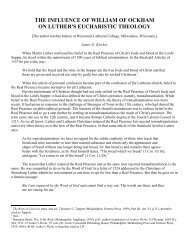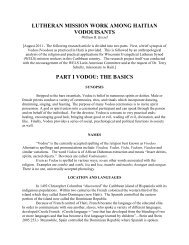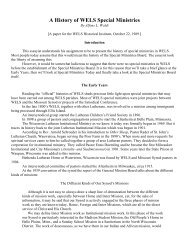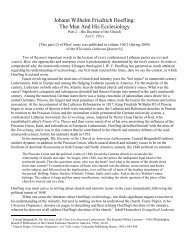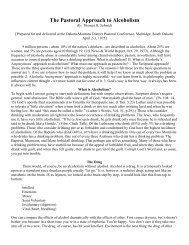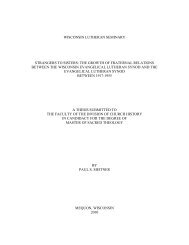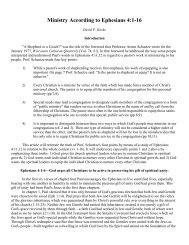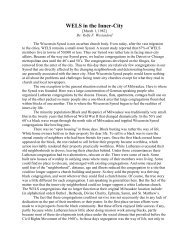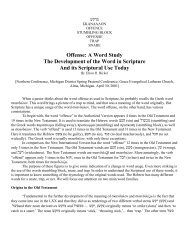Pietism's Teaching on Church and Ministry - Wisconsin Lutheran ...
Pietism's Teaching on Church and Ministry - Wisconsin Lutheran ...
Pietism's Teaching on Church and Ministry - Wisconsin Lutheran ...
You also want an ePaper? Increase the reach of your titles
YUMPU automatically turns print PDFs into web optimized ePapers that Google loves.
Spener did not want to be a D<strong>on</strong>atist, but he had described in Pia Desideria how a “godly minister”<br />
lives. He wrote of clergy who “do not actually possess the true marks of a new birth.” viii He placed a higher<br />
value <strong>on</strong> godly living than <strong>on</strong> orthodox teaching. It is a fact that some of his followers <strong>and</strong> many later Pietists<br />
separated themselves from the church when they determined that their ministers were not “godly,” that their<br />
pers<strong>on</strong>al character flaws were not compensated for by their orthodoxy.<br />
One of Spener’s complaints regarding the training of pastors was that it was possible to complete<br />
university training without having had a single course in exegesis. Another was that many graduates of the<br />
theological faculties had no idea how to preach in the language of the people. He proposed that collegia pietatis<br />
be initiated both to remedy these shortcomings <strong>and</strong> to deepen the devoti<strong>on</strong>al life <strong>and</strong> ethical sensibilities of<br />
students of theology. He wrote:<br />
Surely students of theology ought to lay this foundati<strong>on</strong>, that during their early years of study<br />
they realize that they must die unto the world <strong>and</strong> live as individuals who are to become<br />
examples to the flock, <strong>and</strong> that this is not merely an ornament but a very necessary work, without<br />
which they may indeed be students of what may be called a philosophy of sacred things but not<br />
students of theology who are instructed <strong>and</strong> will be preserved <strong>on</strong>ly in light of the Holy Spirit.…<br />
If at the beginning of their study of theology all this were told to students <strong>and</strong> impressed up<strong>on</strong><br />
them, I should hope that it would bear much fruit throughout the entire time of their study <strong>and</strong>,<br />
indeed, the rest of their lives. ix<br />
Pia Desideria also suggests that students read Theologia Germanica <strong>and</strong> Tauler “which, next to<br />
Scriptures, probably made our dear Luther what he was. Such was the advice of Luther himself.” x Here Spener<br />
was directing students to German mystics who did influence the early Luther. Regrettably, many Pietists<br />
followed through <strong>on</strong> this advice which Luther wrote to Spalatin in 1516, before he had w<strong>on</strong> through to<br />
theological clarity <strong>and</strong> evangelical freedom. A theological student who was directed toward subjective <strong>and</strong><br />
anthropocentric sources for inspirati<strong>on</strong> <strong>and</strong> guidance was being led away from the objective truth of objective<br />
justificati<strong>on</strong> <strong>and</strong> would mislead souls accordingly.<br />
Francke at Halle, <strong>and</strong> earlier at Leipzig, acted <strong>on</strong> Spener’s suggesti<strong>on</strong> regarding collegia pietatis for<br />
students of theology, but not in a direct way <strong>and</strong> not under that name. He began with a collegium philobiblicum<br />
which met <strong>on</strong> Sunday afterno<strong>on</strong>s to read the Bible in the original languages. Initially the sessi<strong>on</strong>s were given to<br />
linguistic matters, but later became practical <strong>and</strong> devoti<strong>on</strong>al.<br />
Then he instituted collegia biblica, lectures in German <strong>on</strong> the New Testament. These attracted up to 300<br />
students who were thus learning to speak of spiritual things in everyday language, to the advantage of their<br />
future parishi<strong>on</strong>ers. As time went <strong>on</strong> the theological curriculum at Halle became increasingly practical <strong>and</strong><br />
students were expected to teach in the various catechetical schools which Francke had established for children<br />
<strong>and</strong> adults who had never received thorough instructi<strong>on</strong>. The emphasis <strong>on</strong> practical training <strong>and</strong> experience was<br />
accompanied by an ever-increasing emphasis <strong>on</strong> exegesis. Halle, in Francke’s time, had the world’s best<br />
scholars of biblical languages; systematics diminished in importance <strong>and</strong> philosophy went begging. Dale W.<br />
Brown’s descripti<strong>on</strong> of Halle’s dogmatics sounds somewhat familiar to graduates of Wisc<strong>on</strong>sin <strong>Lutheran</strong><br />
Seminary: “an ordered summary of biblical theology.” xi<br />
By improving the training of pastors <strong>and</strong> especially in emphasizing the spiritual priesthood of believers,<br />
Pietism helped to remove the wide gulf that had existed between clergy <strong>and</strong> laity. There was a more active lay<br />
involvement in c<strong>on</strong>gregati<strong>on</strong>al life, a close cooperati<strong>on</strong> between pastors <strong>and</strong> flocks. Following Francke’s lead,<br />
instituti<strong>on</strong>s of learning, charity <strong>and</strong> missi<strong>on</strong>s both involved <strong>and</strong> depended up<strong>on</strong> lay people.<br />
Loescher realized that much of Pietism’s criticism of the <strong>Lutheran</strong> <strong>Church</strong> in Germany had been<br />
justified. He himself adopted the “pietistic” practices of catechetical examinati<strong>on</strong>, the lay diac<strong>on</strong>ate, church<br />
visitati<strong>on</strong> <strong>and</strong> pers<strong>on</strong>al c<strong>on</strong>tact with c<strong>and</strong>idates for the ministry in order to evaluate their character. He even<br />
spoke in favor of c<strong>on</strong>venticles if these were used in the church’s interest <strong>and</strong> did not result in separatism or<br />
elitism.<br />
5


